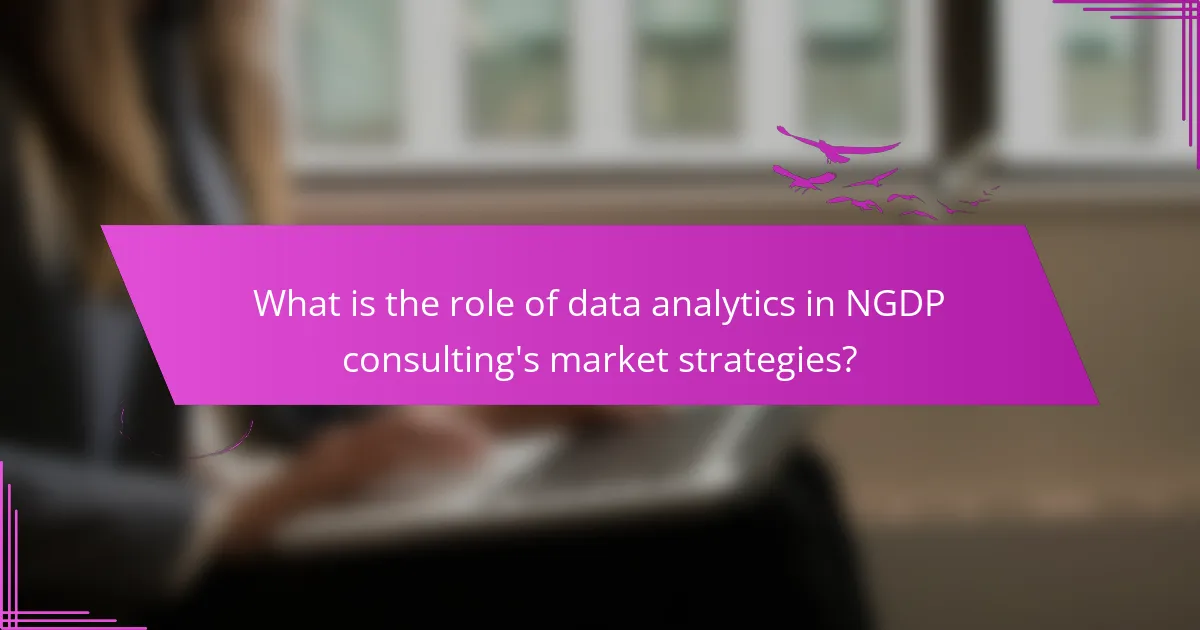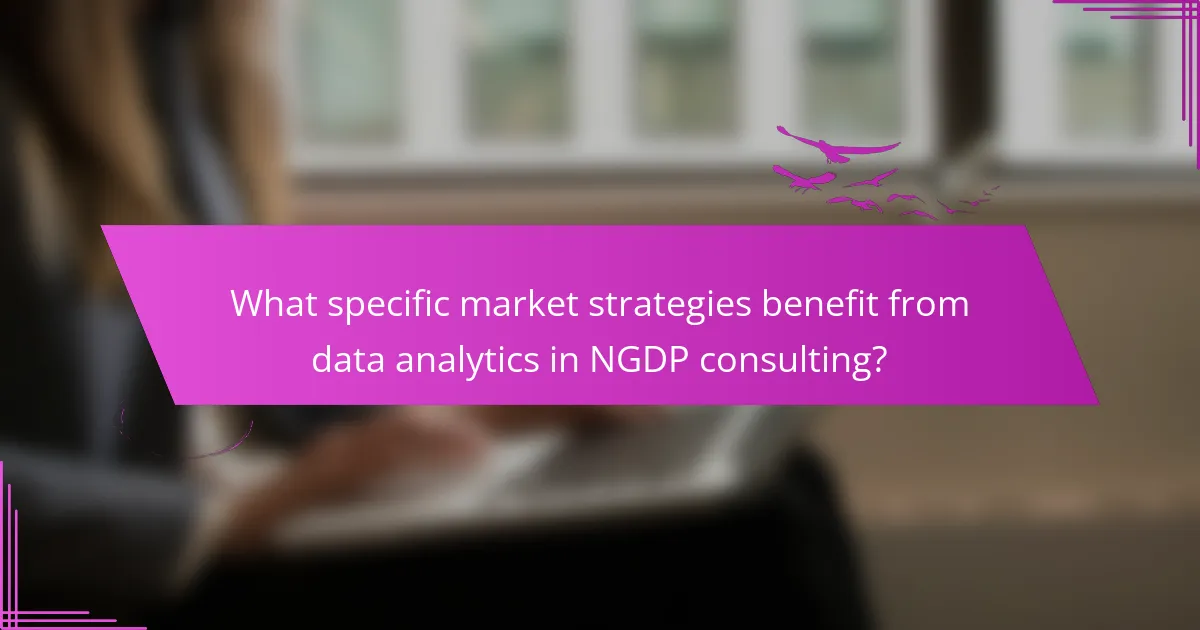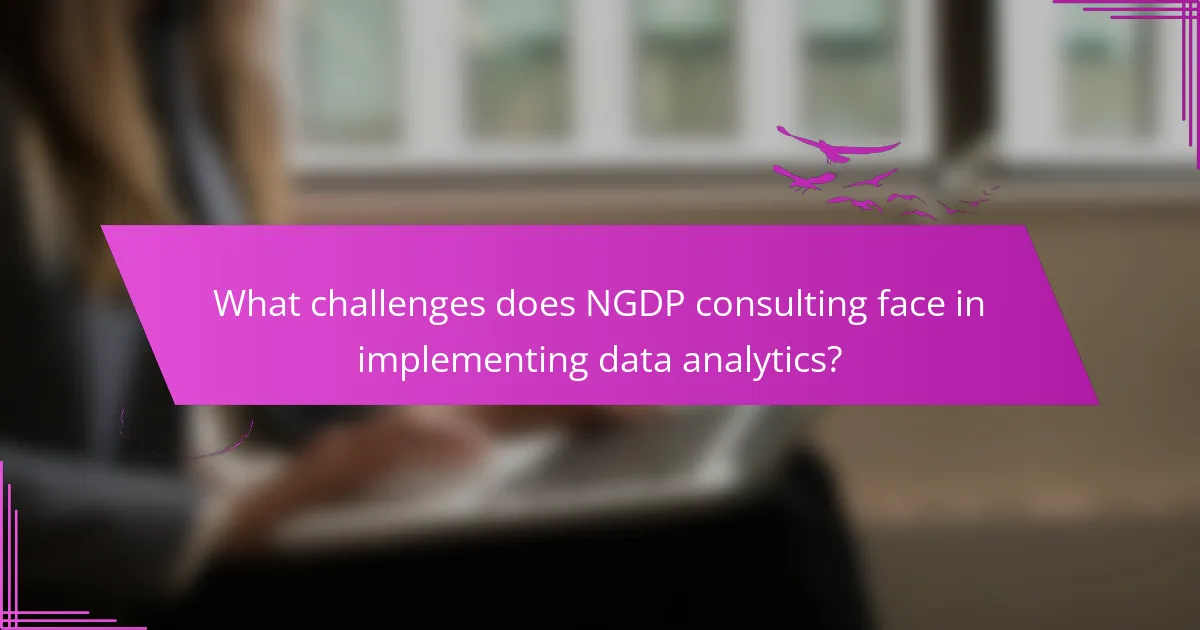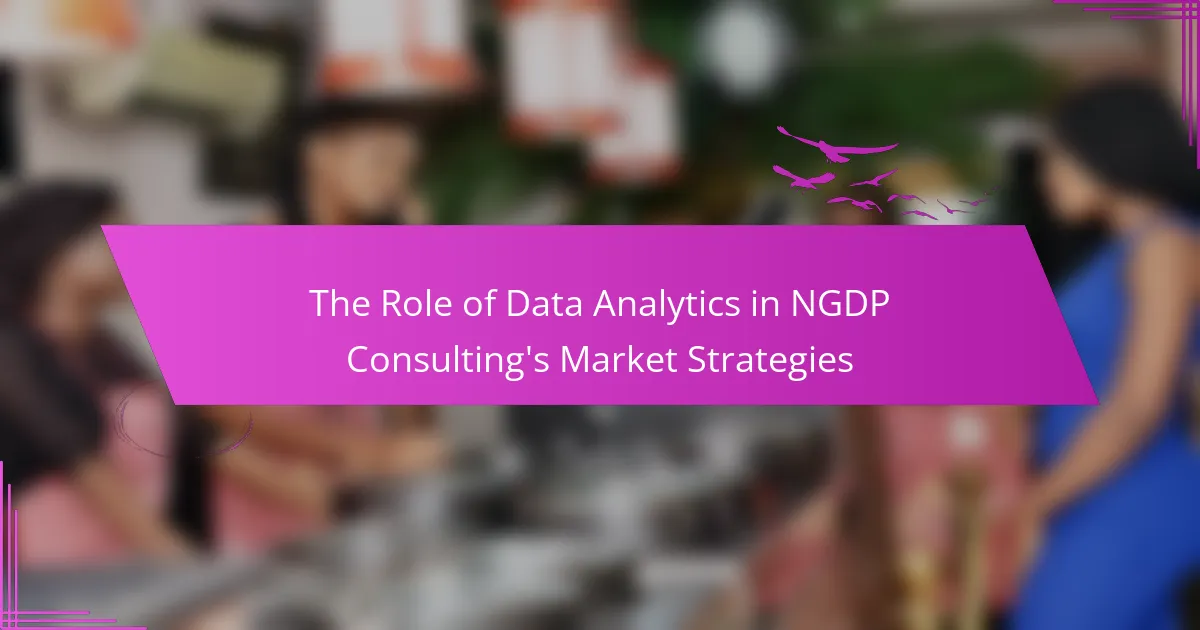
What is the role of data analytics in NGDP consulting’s market strategies?
Data analytics plays a crucial role in NGDP consulting’s market strategies. It enables data-driven decision-making, enhancing the effectiveness of marketing efforts. By analyzing consumer behavior and market trends, NGDP can identify target demographics. This identification allows for tailored marketing campaigns that resonate with specific audiences. Furthermore, data analytics helps in measuring campaign performance. It provides insights into what strategies yield the best results. As a result, NGDP can optimize its marketing approach continuously. This iterative process leads to improved ROI for clients. Ultimately, data analytics is essential for maintaining a competitive edge in the consulting market.
How does data analytics influence decision-making in NGDP consulting?
Data analytics significantly influences decision-making in NGDP consulting by providing actionable insights. It helps consultants analyze market trends effectively. This analysis allows for data-driven strategies tailored to client needs. Consultants use predictive analytics to forecast outcomes and assess risks. By leveraging historical data, they can identify patterns that inform strategic decisions. This leads to improved client satisfaction and better resource allocation. Studies show that companies utilizing data analytics can outperform competitors by 5-6% in productivity. Therefore, data analytics is essential for informed decision-making in NGDP consulting.
What types of data are most relevant for NGDP consulting?
Quantitative data and qualitative data are most relevant for NGDP consulting. Quantitative data includes numerical metrics like market size, sales figures, and financial performance. This data helps in identifying trends and measuring outcomes. Qualitative data encompasses insights from customer feedback, expert opinions, and case studies. It aids in understanding consumer behavior and preferences. Both data types are essential for informed decision-making in market strategies. Together, they provide a comprehensive view of the market landscape.
How is data collected and analyzed in this context?
Data is collected through various methods such as surveys, interviews, and online analytics tools. NGDP Consulting employs these techniques to gather quantitative and qualitative data. Surveys provide structured responses from target audiences. Interviews offer in-depth insights into customer experiences. Online analytics tools track user behavior on digital platforms.
Once collected, data is analyzed using statistical software and data visualization tools. This analysis helps identify trends and patterns in consumer behavior. NGDP Consulting uses these insights to inform market strategies. By interpreting the data, they can make data-driven decisions. This process enhances their ability to respond to market demands effectively.
Why is data-driven decision-making important for NGDP consulting?
Data-driven decision-making is crucial for NGDP consulting because it enhances strategic planning and execution. By leveraging data analytics, NGDP consultants can identify market trends and consumer preferences with precision. This approach leads to more informed decisions that align with client objectives. According to a McKinsey report, companies that utilize data-driven strategies are 23 times more likely to acquire customers. Additionally, data insights allow for real-time adjustments to strategies, improving overall effectiveness. The integration of data analytics fosters a competitive edge in the consulting industry, ultimately driving better client outcomes.
What advantages does data analytics provide over traditional methods?
Data analytics offers several advantages over traditional methods. It enables faster data processing and analysis. Traditional methods often rely on manual processes, which are time-consuming. Data analytics can handle large datasets efficiently. This capability leads to more accurate insights. Real-time data analysis is another significant benefit. Traditional methods may not provide timely information for decision-making. Data analytics also allows for predictive modeling. This helps organizations anticipate trends and behaviors. According to a report by McKinsey, companies that leverage data analytics can improve their productivity by up to 20%. This statistic underscores the effectiveness of data analytics in enhancing business strategies.
How can data analytics improve client outcomes in NGDP consulting?
Data analytics can improve client outcomes in NGDP consulting by providing actionable insights. These insights help identify trends and patterns in client data. By analyzing historical performance, consultants can make informed recommendations. This leads to more effective strategies tailored to client needs. Data-driven decisions reduce risks associated with guesswork. For example, a study found that companies using analytics saw a 5-10% increase in efficiency. Enhanced client satisfaction often results from targeted interventions based on data insights. Ultimately, data analytics fosters continuous improvement in client outcomes.

What specific market strategies benefit from data analytics in NGDP consulting?
Data analytics enhances several market strategies in NGDP consulting. It improves customer segmentation by analyzing consumer behavior and preferences. This allows for tailored marketing campaigns that resonate with specific audience segments. Predictive analytics aids in forecasting market trends and consumer demands. By understanding these trends, consultants can advise clients on proactive strategies. Data-driven decision-making optimizes resource allocation and operational efficiency. It also enhances competitive analysis by identifying market positioning and competitor strengths. Furthermore, data analytics supports performance measurement through key performance indicators (KPIs). This ensures strategies are adjusted based on real-time insights.
How does data analytics enhance market segmentation strategies?
Data analytics enhances market segmentation strategies by providing detailed insights into customer behavior and preferences. It enables businesses to analyze large datasets to identify distinct customer segments. Advanced analytics techniques, such as clustering and predictive modeling, help to uncover patterns that traditional methods might miss. This leads to more accurate targeting and personalized marketing efforts. For instance, companies that utilize data analytics can achieve a 10-20% increase in campaign effectiveness. By leveraging real-time data, organizations can adapt their strategies quickly to changing market conditions. Ultimately, data analytics drives more informed decision-making in market segmentation.
What data points are crucial for effective market segmentation?
Demographic data points are crucial for effective market segmentation. These include age, gender, income, education, and occupation. Psychographic data points also play a significant role. This includes lifestyle, values, interests, and personality traits. Behavioral data points are essential as well. They encompass purchase history, brand loyalty, and product usage rates. Geographic data points provide location-specific insights. This includes region, city, and climate. Combining these data points allows for precise targeting and tailored marketing strategies. Research indicates that companies utilizing detailed segmentation see a 10-20% increase in campaign effectiveness.
How can segmentation drive targeted marketing efforts?
Segmentation can drive targeted marketing efforts by allowing businesses to tailor their strategies to specific consumer groups. This approach enables more personalized messaging and product offerings. For instance, companies can analyze demographic, geographic, and psychographic data to identify distinct market segments. By understanding the unique needs and preferences of each segment, businesses can allocate resources more effectively. Research shows that targeted marketing can increase conversion rates by up to 500%. This demonstrates the tangible benefits of segmentation in enhancing marketing efficiency and effectiveness.
What role does data visualization play in NGDP consulting’s strategies?
Data visualization plays a crucial role in NGDP consulting’s strategies by enhancing data comprehension and decision-making. It transforms complex datasets into intuitive visual formats. This allows stakeholders to quickly identify trends and insights. Effective data visualization improves communication among team members. It also facilitates the presentation of findings to clients. Research shows that visuals can increase retention of information by 65%. Additionally, data visualization tools enable real-time analysis, which supports agile strategy adjustments. Overall, it is an essential component of NGDP consulting’s analytical approach.
How can visual data representations aid in understanding market trends?
Visual data representations enhance understanding of market trends by simplifying complex information. They allow stakeholders to quickly grasp patterns and anomalies. Charts, graphs, and dashboards make data more accessible. This visual clarity aids in decision-making processes. Research shows that 65% of people are visual learners. Visuals help retain information better than text alone. They can highlight key performance indicators effectively. Consequently, businesses can adapt strategies based on clear insights.
What tools are commonly used for data visualization in this field?
Common tools for data visualization in this field include Tableau, Power BI, and Google Data Studio. Tableau offers interactive dashboards and visual analytics capabilities. Power BI integrates well with Microsoft products and provides robust data modeling features. Google Data Studio is a free tool that allows for easy sharing and collaboration. Other notable tools are D3.js for custom visualizations and QlikView for business intelligence applications. Each of these tools supports various data sources and enhances data interpretation. Their widespread use in data analytics ensures effective communication of insights.

What challenges does NGDP consulting face in implementing data analytics?
NGDP consulting faces several challenges in implementing data analytics. One significant challenge is data quality. Inaccurate or incomplete data can lead to misleading insights. Another challenge is the integration of disparate data sources. Merging data from different systems often proves complex. Additionally, there is a skills gap within the team. Many employees may lack the necessary expertise in data analytics tools. Resistance to change also hinders implementation. Employees may be reluctant to adopt new technologies or processes. Lastly, managing data privacy and compliance is critical. Adhering to regulations can complicate data handling practices. These challenges collectively impact the effectiveness of data analytics in NGDP consulting’s market strategies.
How can data quality issues impact analytics outcomes?
Data quality issues can significantly impact analytics outcomes by leading to inaccurate insights. Poor data quality results in misleading conclusions that can affect decision-making. For instance, if data is incomplete, it may omit critical information needed for accurate analysis. Inaccurate data can skew results, causing businesses to make misguided strategies. A study by Gartner found that organizations lose an average of $15 million annually due to poor data quality. Therefore, maintaining high data quality is essential for reliable analytics outcomes.
What steps can be taken to ensure high-quality data?
To ensure high-quality data, organizations should implement several key steps. First, establish clear data governance policies. These policies define data ownership, usage, and quality standards. Second, invest in data validation tools. These tools help identify inaccuracies and inconsistencies in data sets. Third, conduct regular data audits. Audits assess data quality and ensure compliance with established standards. Fourth, provide training for staff on data management practices. Educated employees are more likely to maintain data integrity. Fifth, utilize automated data collection methods. Automation reduces human error and enhances efficiency. Lastly, foster a culture of data quality within the organization. Promoting awareness and accountability encourages everyone to prioritize high-quality data. These steps collectively contribute to the reliability and accuracy of data used in analytics and decision-making.
How do data privacy regulations affect analytics practices?
Data privacy regulations significantly impact analytics practices by imposing strict guidelines on data collection and usage. Organizations must ensure compliance with laws like GDPR and CCPA. These regulations mandate obtaining explicit consent from users before processing their personal data. Consequently, analytics practices shift towards anonymization and aggregation of data to protect individual identities. Firms may face penalties for non-compliance, which can reach millions of dollars. This leads to increased investment in data governance and compliance frameworks. Additionally, analytics teams must collaborate closely with legal and compliance departments. As a result, many organizations prioritize transparency in their data practices to build consumer trust. Overall, data privacy regulations reshape how organizations approach data analytics.
What best practices should be followed for effective data analytics in NGDP consulting?
Effective data analytics in NGDP consulting requires a structured approach. Establish clear objectives for analytics projects. This ensures alignment with business goals. Utilize robust data collection methods to gather high-quality data. Quality data is essential for accurate analysis. Implement advanced analytical tools and technologies. These tools enhance the capability to derive insights. Foster a culture of data-driven decision-making within the organization. This encourages all stakeholders to rely on data insights. Regularly review and refine analytics processes. Continuous improvement leads to better outcomes. Collaborate with cross-functional teams for diverse perspectives. Diverse input enriches the analysis and recommendations. Lastly, ensure compliance with data privacy regulations. Adhering to regulations builds trust and credibility.
How can consulting firms develop a data-driven culture?
Consulting firms can develop a data-driven culture by prioritizing data literacy among employees. This involves providing training programs that enhance analytical skills. Regular workshops can facilitate understanding of data interpretation. Firms should also establish clear data governance policies. These policies define data ownership and usage protocols. Implementing advanced analytics tools is essential for effective data utilization. Access to these tools enables employees to make informed decisions. Leadership must demonstrate commitment by using data in strategic planning. This sets a precedent for a data-driven mindset across the organization. According to a McKinsey report, organizations that prioritize data-driven decision-making increase productivity by 5-6%.
What skills are essential for professionals working with data analytics?
Essential skills for professionals working with data analytics include statistical analysis, programming, and data visualization. Statistical analysis enables professionals to interpret data effectively. Programming languages like Python and R are crucial for data manipulation and algorithm development. Data visualization skills help in presenting insights clearly. Additionally, knowledge of databases and SQL is important for data retrieval. Communication skills are necessary to convey findings to non-technical stakeholders. Critical thinking aids in problem-solving and decision-making processes. Familiarity with machine learning concepts enhances predictive analytics capabilities. These skills collectively support effective data-driven decision-making in organizations.
What are the future trends in data analytics for NGDP consulting?
Future trends in data analytics for NGDP consulting include increased automation and advanced predictive analytics. Automation streamlines data processing, allowing for faster insights. Predictive analytics enhances decision-making by forecasting future trends based on historical data.
Moreover, the integration of artificial intelligence is expected to improve data interpretation. AI algorithms can analyze vast datasets more efficiently than traditional methods. Real-time analytics will also gain prominence, enabling immediate responses to market changes.
Additionally, data visualization tools will evolve, making complex data more accessible. Enhanced visualizations will help stakeholders understand insights quickly. Lastly, a focus on data ethics and privacy will shape analytics practices, ensuring compliance with regulations. These trends highlight the evolving landscape of data analytics in NGDP consulting.
How is artificial intelligence shaping data analytics in consulting?
Artificial intelligence is transforming data analytics in consulting by enhancing data processing capabilities. AI algorithms can analyze large datasets more quickly and accurately than traditional methods. This leads to more insightful data interpretations and actionable recommendations for clients. AI also enables predictive analytics, allowing consultants to forecast trends and outcomes based on historical data. Furthermore, machine learning models improve over time, refining their predictions as more data becomes available. A study by McKinsey & Company found that organizations leveraging AI in analytics can increase their productivity by up to 40%. This demonstrates the significant impact of AI on data-driven decision-making in consulting.
What emerging technologies should NGDP consultants be aware of?
NGDP consultants should be aware of artificial intelligence (AI), machine learning (ML), and blockchain technologies. AI enhances data analysis and decision-making processes. ML algorithms can identify patterns in large datasets, improving predictive analytics. Blockchain offers secure data tracking and transparency in transactions. Additionally, Internet of Things (IoT) devices provide real-time data collection, enabling more informed strategies. These technologies are increasingly adopted in various industries, demonstrating their relevance. For instance, a report by McKinsey highlights that organizations using AI can improve their productivity by up to 40%. Thus, staying informed about these technologies is crucial for NGDP consultants.
The main entity of this article is data analytics within the context of NGDP consulting’s market strategies. The article outlines the critical role of data analytics in enhancing decision-making, optimizing marketing strategies, and improving client outcomes through data-driven insights. Key topics include the types of relevant data, methods of data collection and analysis, the advantages of data analytics over traditional methods, and the challenges faced in implementation. Additionally, it discusses the importance of data quality, privacy regulations, and emerging technologies shaping the future of data analytics in consulting.
